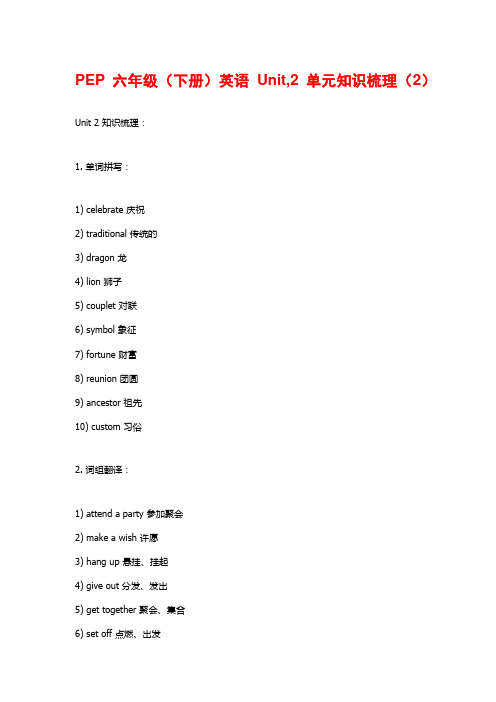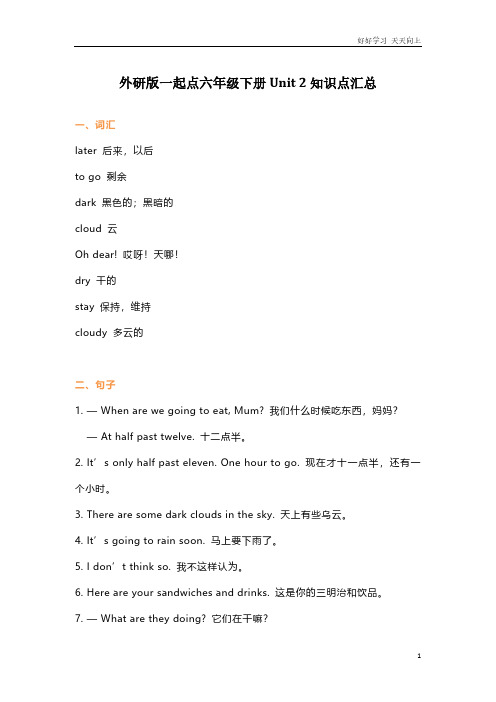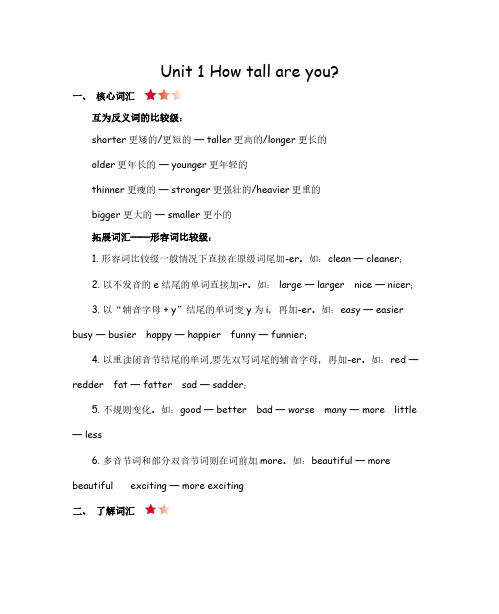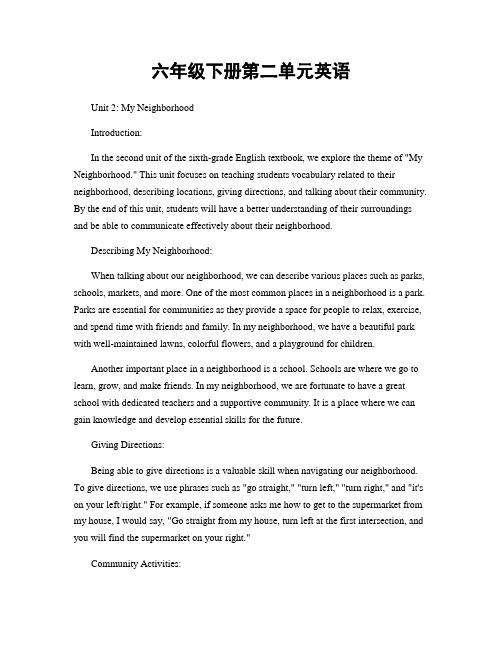PEP六年级英语下册 Unit 2单元知识梳理(1) 精品
人教版六年级英语下册第二单元Unit2知识总结

人教版六年级英语下册第二单元Unit2知识总结Unit 2: Last ___In this unit。
we learn some ___.Vocabulary:Clean: to make something tidy and free of dirt。
Example: I cleaned my room last weekend.Wash: to clean something using water and soap。
Example: ___.Stay: to remain in one place or n。
Example: I stayed at home last night.Watch: to look at something。
usually a TV show or movie。
Example: I ___.___: ___: I ___.Have: to possess or ___ something。
Example: I had a cold the day before ___.See: to watch or observe something。
Example: I saw a film.Read: to look at and understand written words。
Example: I read a book.Sleep: to rest with your eyes closed and your body inactive.Other words:Cook: ___.Visit: to go and see someone at their home or place of work.Play: to engage in an activity for ___.Study: to learn about a subject.Do: to perform an n or activity.Go: to travel to a place.Make: to create or produce something.Show: to perform or display something for others to see.___: ___.Better: comparative form of "good," meaning more good or of higher quality.Faster: comparative form of "fast," meaning more fast or with greater speed.Hotel: a place where travelers ___.Fixed: repaired or made whole.___: ___.Lamp: a light fixture.Loud: producing a lot of noise or sound.Enjoy: to take pleasure in something.Stay: ___.Grammar:1.Past tense of verbs:Regular verbs: add "-ed" to the base form of the verb。
PEP六年级(下册)英语Unit,2单元知识梳理(2)

PEP六年级(下册)英语Unit,2单元知识梳理(2)Unit 2 知识梳理:1. 单词拼写:1) celebrate 庆祝2) traditional 传统的3) dragon 龙4) lion 狮子5) couplet 对联6) symbol 象征7) fortune 财富8) reunion 团圆9) ancestor 祖先10) custom 习俗2. 词组翻译:1) attend a party 参加聚会2) make a wish 许愿3) hang up 悬挂、挂起4) give out 分发、发出5) get together 聚会、集合6) set off 点燃、出发7) watch fireworks 观看烟花8) light candles 点燃蜡烛9) send out 发送、寄出10) receive red packets 领取红包3. 句子翻译:1) The Chinese New Year is the biggest traditional festival in China.中国的春节是中国最重要的传统节日。
2) People celebrate the Chinese New Year with various customs and traditions. 人们用各种各样的习俗和传统来庆祝春节。
3) During the Chinese New Year, people light candles to scare away evil spirits. 在中国的春节期间,人们点燃蜡烛来驱邪。
4) My family always gets together for a big reunion on Chinese New Year's Eve. 我家每年春节前夜都会举行一次大聚会。
5) According to Chinese tradition, we should clean our homes to sweep away bad luck before the New Year starts.根据中国的传统,我们应该在新年开始之前打扫家里以扫除厄运。
外研版一起点六年级下册Unit 2知识点汇总

外研版一起点六年级下册Unit 2知识点汇总一、词汇later 后来,以后to go 剩余dark 黑色的;黑暗的cloud 云Oh dear! 哎呀!天哪!dry 干的stay 保持,维持cloudy 多云的二、句子1. — When are we going to eat, Mum? 我们什么时候吃东西,妈妈?— At half past twelve. 十二点半。
2. It’s only half past eleven. One hour to go. 现在才十一点半,还有一个小时。
3. There are some dark clouds in the sky. 天上有些乌云。
4. It’s going to rain soon. 马上要下雨了。
5. I don’t think so. 我不这样认为。
6. Here are your sandwiches and drinks. 这是你的三明治和饮品。
7. — What are they doing? 它们在干嘛?— They are eating our sandwiches. 它们在吃我们的三明治。
8. It looks like you’re going to stay hungry, Simon! 看起来你要挨饿了,西蒙。
9. It will be sunny in Harbin. 哈尔滨将会是晴天。
10. It will be cloudy in Tianjin. 天津将会是多云。
11. It will snow in Beijing. 北京将会下雪。
12. — What will the weather be like in Beijing? 北京的天气将会怎么样?— It will be sunny. 将会是晴天。
13. — What are we going to do today? 今天我们要干嘛?— We are going to the park. 我们要去公园。
人教版PEP英语六年级下册Unit 2 Last weekend grammar (1)等

go for a walk
I often go for a walk with Zhang Peng on Sundays!
take a dancing class
have a dancing class
Sometimes I take a dancing class on Sundays!
Hi, I am Pedro. On the weekend, I often play computer and play football. But I am also hard-working. I usually sweep the floor and make the bed. Sometimes I cook breakfast.
5、他上周六去游泳了。 _________H_e__w_e_nt__s_w_im_m__in_g_last Saturday.
6、I went to the bookstore by subway.(对划线提问)
__________H__o_w_d_i_d_y_o_u__go__t_o_b_o_o_k_s_to_r_e__?_
yesterday, last night (week, month, year…) two days ago, a week ago, three years ago… in 1990, (in 1998…)
be 动词的过去时:
肯定句 主语 + be动词的过去式(was, were)~ .
否定句 主语 + be动词的过去式(was, were)+ not ~ . 疑问句 be 动词的过去式(was, were)+主语 ~ ?
使用
行动
以重读闭音节为结尾且只有
新版PEP六年级下册二单元知识整理

====Word行业资料分享--可编辑版本--双击可删====一、动词过去时的变化规律:1、一般在动词原形末尾加-ed 如:visit-visited2、词尾是不发音e的动词加;如:like-liked3、末尾只有一个辅音字母的重度闭音节,先双写这个辅音字母,再加-ed ;如:stop-stopped4、结尾是“辅音字母+y”的动词,变“y”为“i”, 再加-ed carry-carried二、写出下列规则动词的过去式:clean- wash- stay- watch- clean-talk- cook- fix- want- tastelisten- play- like- visit- stop-study- live- plan- cry love-三、写出下列不规则动词的过去式:am/is- do drink- read- see-have- sleep- go make- don’t -get- are-四、翻译下列短语:打扫我的房间洗我的衣服留在家里看电视喝茶在电视上看少儿节目做别的事情读书看电影感冒睡觉许多整个周末上个周末昨天晚上上周一前天去划船铺床做饭踢足球修理破损的椅子听吵闹的音乐整夜洗我的书包去公园做我的家庭作业去钓鱼拜访我的祖父母五、翻译下列句子:1、你周末过得怎么样?2、很好,谢谢3、你干什么了?4、我和你奶奶呆在家里。
我们喝了下午茶,还看了电视。
5、你还做了其他什么事吗?6、是的,我打扫了房间,还看了电视。
7、我想买期新的电影杂志。
8、你上周末干什么了?你看电影了吗?9、没有,我感冒了。
整个周末都呆在家里睡觉。
10、它比走路要快得多。
六、用合适的词填空1、I stayed at home ______your grandma.2、I watched some children’s shows ______ TV.3、Thank you for ______ in our hotel.4、The people ______ Room 301 listened to loud music.七、按要求改变下列句子:1、I did my homework last night.否定句:一般疑问句:肯定回答:否定回答:就划线部分提问:2、He played computer games last Sunday.源-于-网-络-收-集====Word行业资料分享--可编辑版本--双击可删====否定句:一般疑问句:肯定回答:否定回答:就划线部分提问:源-于-网-络-收-集。
人教PEP版英语六年级下册Unit 1-4知识点总结(期末复习)

Unit1How tall are you?一、核心词汇互为反义词的比较级:shorter更矮的/更短的—taller更高的/longer更长的older更年长的—younger更年轻的thinner更瘦的—stronger更强壮的/heavier更重的bigger更大的—smaller更小的拓展词汇——形容词比较级:1.形容词比较级一般情况下直接在原级词尾加-er。
如:clean—cleaner;2.以不发音的e结尾的单词直接加-r。
如:large—larger nice—nicer;3.以“辅音字母+y”结尾的单词变y为i,再加-er。
如:easy—easier busy—busier happy—happier funny—funnier;4.以重读闭音节结尾的单词,要先双写词尾的辅音字母,再加-er。
如:red—redder fat—fatter sad—sadder;5.不规则变化。
如:good—better bad—worse many—more little —less6.多音节词和部分双音节词则在词前加more。
如:beautiful—more beautiful exciting—more exciting二、了解词汇dinosaur恐龙hall大厅metre米(美式英语:meter)than比both两个都kilogram千克;公斤countryside乡村lower(low的比较级)更低地shadow阴影;影子smarter(smart的比较级)更聪明的become开始变得;变成三、核心句型1.—How tall are you?你有多高?—I’m1.64metres.我身高1.64米。
2.—What size are your shoes,Mike?迈克,你穿多大号的鞋?—Size7.7号。
3.—How heavy are you?你体重多少?—I’m48kilograms.我体重48公斤。
六年级下册第二单元英语

六年级下册第二单元英语Unit 2: My NeighborhoodIntroduction:In the second unit of the sixth-grade English textbook, we explore the theme of "My Neighborhood." This unit focuses on teaching students vocabulary related to their neighborhood, describing locations, giving directions, and talking about their community. By the end of this unit, students will have a better understanding of their surroundings and be able to communicate effectively about their neighborhood.Describing My Neighborhood:When talking about our neighborhood, we can describe various places such as parks, schools, markets, and more. One of the most common places in a neighborhood is a park. Parks are essential for communities as they provide a space for people to relax, exercise, and spend time with friends and family. In my neighborhood, we have a beautiful park with well-maintained lawns, colorful flowers, and a playground for children.Another important place in a neighborhood is a school. Schools are where we go to learn, grow, and make friends. In my neighborhood, we are fortunate to have a great school with dedicated teachers and a supportive community. It is a place where we can gain knowledge and develop essential skills for the future.Giving Directions:Being able to give directions is a valuable skill when navigating our neighborhood. To give directions, we use phrases such as "go straight," "turn left," "turn right," and "it's on your left/right." For example, if someone asks me how to get to the supermarket from my house, I would say, "Go straight from my house, turn left at the first intersection, and you will find the supermarket on your right."Community Activities:Communities often organize various activities to bring people together and foster a sense of unity. In my neighborhood, we have annual events like a neighborhood picnic, a charity run, and a cultural festival. These events provide an opportunity for residents to socialize, showcase their talents, and learn about different cultures. Such activities help create a strong bond among neighbors and promote a sense of belonging.Safety in the Neighborhood:Safety is a crucial aspect of any neighborhood. It is important to feel secure and protected in our surroundings. To ensure safety, communities often have measures such as streetlights, security guards, and neighborhood watch programs. In my neighborhood, we have well-lit streets, security cameras, and regular patrols by security personnel. These precautions help deter potential criminal activities and create a safe environment for everyone.Conclusion:In conclusion, the second unit of the sixth-grade English textbook focuses on the theme of "My Neighborhood." Through this unit, students learn how to describe their neighborhood, give directions, and discuss community activities. Understanding our surroundings and being able to communicate effectively about our neighborhood is essential for building strong communities. By the end of this unit, students will have a better appreciation for their neighborhood and be able to navigate it confidently.。
六年级下册英语课件-总复习第一篇温故知新第26课时 六年级下册 Unit 2 人教(PEP)(共11张PPT)

子
afternoon and watched TV. 我和你奶奶待在家里。我们喝了下午
茶,还看了电视。
续表
3. A:Did you do anything else? 你还做了其他什么事吗?
B:Yes, I cleaned my room and washed my clothes. 是的,我打
扫了房间,还洗了衣服。
三、Read, choose and fill.阅读下面短文,根据上下文选词填空,使短文通 顺、完整。
slept,was,from,stayed,trip,big,quiet,read,restaurant,tasted
Last Saturday, I went on a 1. _t_r_ip__ with my family. We 2. _st_a_y_e_dat a hotel because it was very late. The hotel was far 3. _f_r_o_m_ the downtown. It was very 4. __q_u_i_e.t The room was 5. __b_ig__ and the beds are big, too. There 6. _w__a_s_ a big sofa at the corner. I sat on it and 7. _r_e_a_d_ a storybook. It was very comfortable. We felt hungry. Then we went to a 8. _r_e_st_a_u_r_a_n_t_ next to the hotel. The food there 9. _ta_s_t_e_d very good. After the big meal, we went to bed early. We 10. _s_le_p_t_ very well.
- 1、下载文档前请自行甄别文档内容的完整性,平台不提供额外的编辑、内容补充、找答案等附加服务。
- 2、"仅部分预览"的文档,不可在线预览部分如存在完整性等问题,可反馈申请退款(可完整预览的文档不适用该条件!)。
- 3、如文档侵犯您的权益,请联系客服反馈,我们会尽快为您处理(人工客服工作时间:9:00-18:30)。
六年级下册单元知识点
第二单元:
四会单词have a fever 发烧have a sore throat喉咙疼have a cold 感冒
have a toothache 牙疼have a headache 头疼matter事情,麻烦sore 疼的hurt疼痛nose 鼻子tired疲劳的,累的excited兴奋的angry生气的happy高兴的bored无聊的,烦人的sad 忧伤的,悲伤的
四会句型:What’s the matter? 怎么了?
My throat is sore. My nose hurts.我喉咙疼。
我鼻子疼。
How are you, Liu Yun? You look happy. 你好吗,刘云。
你看起来很高兴。
How are you, Sarah? You look sad today. 你好吗,Sarah?今天,你看起来很难过。
应该掌握的知识点:
1、ache是名词,它表示连续固定的疼痛,它是个体弱多病的家伙,身体部位名称是怕它了,哪个部位不小心被它跟上了,就倒霉了。
earache耳朵痛,stomachache 胃疼,backache 背疼,heartache 心脏病
2、sore , ache 与hurt
sore是形容词,表示“疼的、痛的”放在名词前或系动词be后,如:a sore nose 鼻子疼My nose is sore. 我的鼻子疼。
ache是名词,常常放在名词后,表示连续固定的疼痛,如:headache 头疼stomachache 胃疼,backache 背疼,heartache 心脏病
hurt是动词,指“刺痛、使受伤痛”,如:he hurts his leg.他伤了腿。
这时我们还可以说“His leg hurts.他腿疼。
”有时它们还可以表达相同的含义,如:I have a sore back==I have a backache==My back hurts.但是要注意的是,并不是所有的词都可以这样转换,有些固定的用法是不能改变的。
3、What’s the matter? matter做名词时意思是“要紧事,麻烦事,问题”,在此用法中一定要加定冠词the。
其同义句为:What’s wrong? What’s the trouble? What’s up? What’s the problem? 作为看病用语,它常用来询问病人的身体状况。
4、might 与may: might 与may 都可以表示可能性。
might 在表示推测时,把握比较小,表示特别尊重对方,心里没底,更带有试探性。
may表示一件事或许会发生(或是某种情况可能会发生)。
5、hear 与listen: hear表示“听见,听到”的结果。
如:I listened but
I couldn’t hear anything.我注意听,但什么也没听到。
listen 表示“听,注意听,倾听”的动作。
如:They are listening to the radio.他们在听广播。
6、关于一般现在时:
一般现在时的用法: 表示经常或者反复发生的动作。
如: 我每天吃午饭。
I have lunch every day. 还表示现在存在的一种状态.。
如:我姐姐是一位老师。
My sister is a teacher.
一般现在时态经常与often(经常)sometimes(有时)always(总是)usually(通常)等副词连用,也经常与every day(每天), every week(每周), every month(每月), every term(每学期), every year (每年), once a week (一周一次),twice a year(一年两次)等时间状语连用。
(1)一般现在时态分为be 动词的一般现在时和实义动词的一般现在时。
1)be 动词包括am,is,are,中文为“是”,这三个词的用法要随着主语的变化而变化。
“am” 用于第一人称单数(I); “is”用于第三人称单数(he,she,it);“are”用于第一人称复数(we),第二人称单数和复数(you), 第三人称复数(they)。
可以记住以下顺口溜:am 是专门来管“我”,is 只管“他,她,它”,are 就管“你”和“大家”。
2)一般疑问句和否定句
I am a teacher. (我是一位老师)
You are his friend.(你是他的朋友)
She is a nurse.(她是一名护士)
以上三个句子都是肯定句。
此类句子变成疑问句和否定句时,有些地方的语序和汉语不同,需特别注意。
变为疑问句时,把动词be “am,is,are”放在句首,回答时也要使用be 动词;变为否定句时,把表示否定的not 放在“am is are”的后面,其中可以简写为:is not ---- isn't are not ---- aren't
am not 没有简写形式。
如:Am I a teacher? Yes, I am. (No, I am not.)
Are you his friend? Yes, you are. (No, you are not.)
Is she a nurse? Yes, she is. (No, she is not.)
注意:如果are not, is not 放在句尾时,不能使用简写,必须写出整个单词。
否定句为:I am not a teacher. You are not his friend. She is not a nurse. 3)如果句子的动词不是be 动词“am is are”而是其他实义动词, 疑问句和否定句要借助于助动词“do”或者“does”,也就是说be 动词和实义动词原形不能同时使用。
这里的“do” “does”本身没有什么意义,只是帮助构成疑问句和否定句。
一般疑问句读时必须用降调。
“do”和“does”的使用要随着人称的变化而变化。
请看下面两组句子,注意区分他们的共同点和不同点。
I go to school every day. He goes to school every day.
I don't go to school every day. He doesn't go to school every day.
Do you go to school every day? Does he go to school every day?
Yes, I do. (No, I don't) Yes, he does. (No, he doesn't)
这两组句子中,由于人称的不同,句子的结构也不同,具体如下:当主语是第三人称单数时,肯定句为:主语+ 动词的s 形式+ 宾语
否定句为:主语+ 助动词doesn't + 动词原形+ 宾语
疑问句为:Does + 主语+ 动词原形+ 宾语
肯定回答和否定回答也要使用助动词does.
注:第三人称单数用了does 后面就不用动词的s 形式了,而用动词原形。
动词的一般现在时态, 除了第三人称单数(he she it) 外,其余都用动词原形。
当主语是其他人称时,肯定句为:主语+动词原形+ 宾语否定句为:主语+ 助动词don't + 动词原形+ 宾语
疑问句为:Do + 主语+ 动词原形+ 宾语
肯定回答和否定回答也要使用助动词do。
注:变为疑问句,要在句首加“do”; 变为否定句, 要在动词前面加“do not”, 可以简写为“don't”.。
